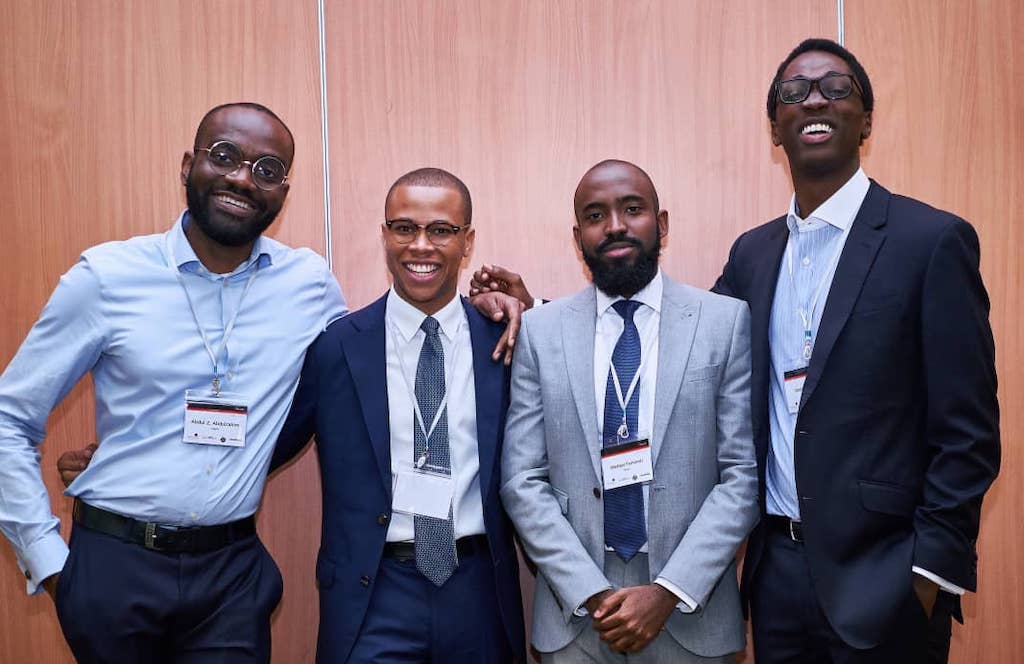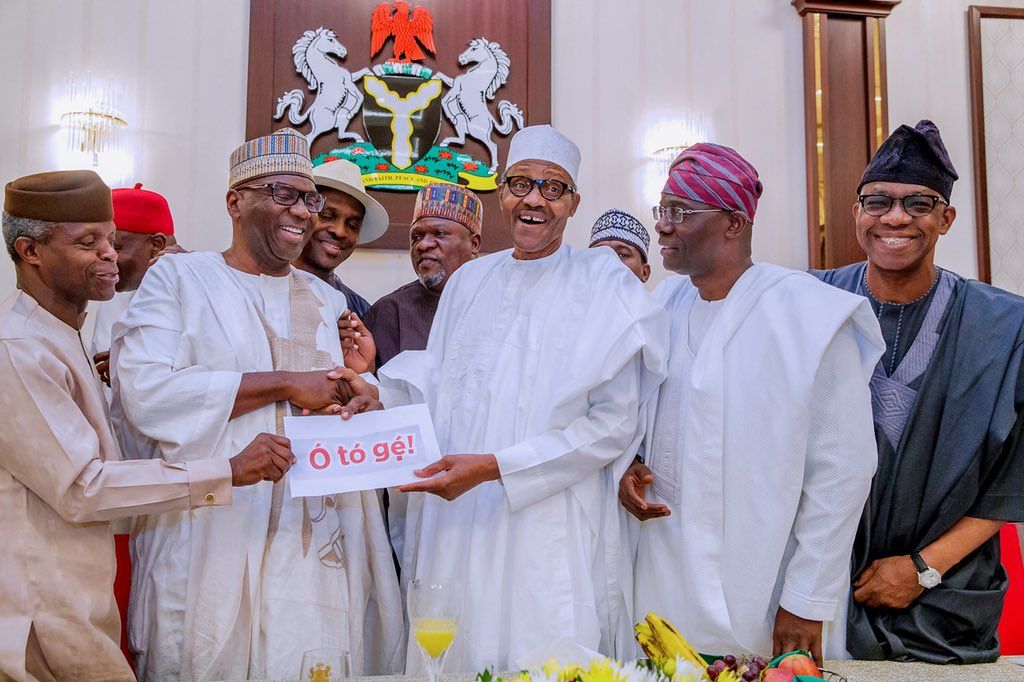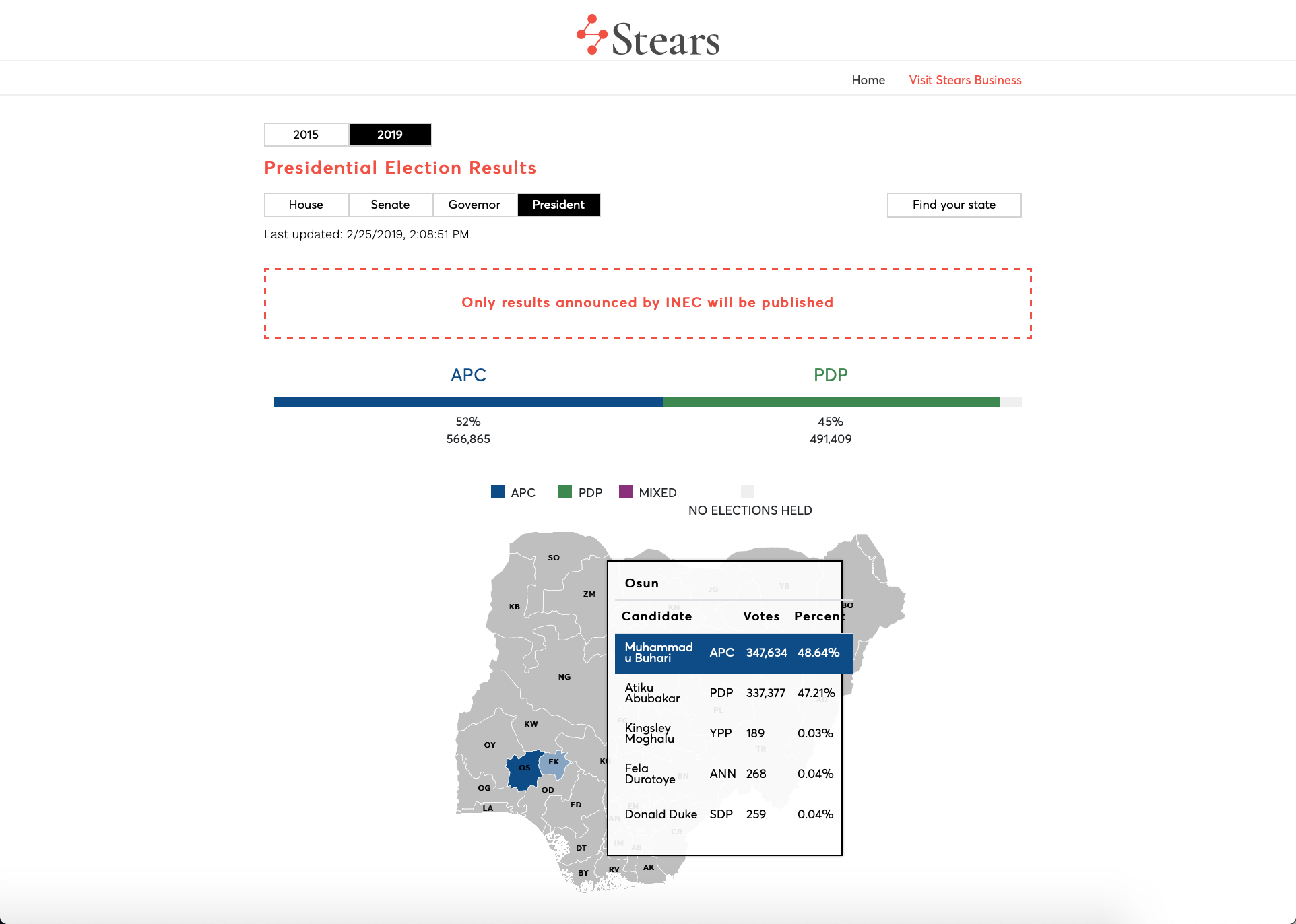Meet the young Nigerians visualising Nigeria's Election data—Stears
Stears Election centre reveals that with the current INEC-announced results, APC and PDP account for 97% of the Presidential votes with APC in the lead.

Left to right, Stears cofounders: Abdul Abdulrahim, Preston Ideh, Michael Famoroti, with advisor Olabode Ogunlana
Two weeks before the much-awaited 2019 Nigerian Presidential elections I had the pleasure of meeting with partners at Stears Business, makers of the Nigerian Elections Centre. We talked about Stears history, the need for access to accurate data, and the development of the Stears Election Center.
Stears Election Centre and the Nigerian Elections

A few years ago, three Nigerians in the diaspora studying at the London School of Economics (LSE) met with another Nigerian at Imperial College to discuss a relatable Nigerian problem—poor access to high-quality data and content.
Starting 2016, these four Stears cofounders set to work with a group of Nigerian writers to distribute data-driven insight. Today, Stears is one of the most regarded news sites sharing opinions, analysis and reporting on the Nigerian situation.
However, in October 2018, it dawned on them that "there is no data more relevant and relatable to all Nigerians than election results", so, they got to work.

Every four years in Nigeria, there is a voting exercise that sees citizens go out to vote for their preferred candidates. However, due to the high level of voter apathy in the state a lot of Nigerians do not seem to care about the elections. Many end up not registering, collecting or actually voting on the D-Day.
At crucial times like elections, citizens are flooded with fake news, click-bait-driven stories and inaccurate reporting spread via social media, and as such they cannot tell when information is true or false. This is why social media organisations like Facebook have put structures in place to reduce the spread of misinformation and protect election integrity.
Facebook has more than 26 million users in Nigeria
"There is a poor culture around data-driven insight, meanng that policymakers, politicians, investors and entrepreneurs rely on anecdotes of Nigeria's future, fabricated or out-of-date data and even propaganda when framing issues", says Michael.
This poor data-driven culture is fueled by the near impossibility of accessing said data. And it is easy to guess why.
"Availability of data requires rigorous research and data collection, powered by a coordinated system to disseminate this data", Stears affirms.
Nigeria has a National Bureau of Statistics (NBS) that oversees and publishes statistics for the country. However, the burden of publishing elections data is left to the organising body—Independent National Electoral Commission (INEC).
Unlike INEC which published the 2015 elections data on a spreadsheet document, the NBS goes further to visualise their own data, turning it to insights which is useful in decision making.
These problems of poor access to inaccurate and rudimentary data is what Stears is looking to solve with their Elections Centre platform.

Stears Election Center
Currently, on the Stears Election center site, visitors are able to see results of Nigerian state and constituency results with the exclusion of wards and polling units. However, they have plans to include the local and polling unit data.
"Our longer-term goal with the Election Centre is to go deeper into local and polling unit data; recording, collecting and disseminating data beyond results", Stears confirmed.
They have completed the upload of Presidential and Gubernatorial data from the 2015 elections, and intend to go further back to previous elections.
Users of the site can drill down to States. So for instance, as a Lagosian I can choose "Find your State" and select Lagos, which falls into the South-Western geo-political zone of Nigeria.

Figure 2: Inside Lagos State, retrieved by 2:30 PM from Stears Election Centre
The site also doubles as a portal for voters education. Citizens and site visitors can learn more about how elections work in Nigeria. Questions like "How is the President of Nigeria determined?" and "What are the qualifications to become the President?" are answered on the site.
While Stears only publishes results announced by INEC, they have mentioned that they did not leverage any special connections to INEC staff.
For Stears partner, Michael, success is when they are able to "give people a source they can trust for accurate election results and build a habit of looking at trends in election results".
The future for Stears Election center is having data on incident reporting, exit polling and making predictive analytics. At the end of the elections, they are looking to tell the "full story of the 2019 elections" via the online publication arm, Stears Business.






